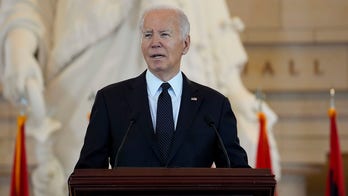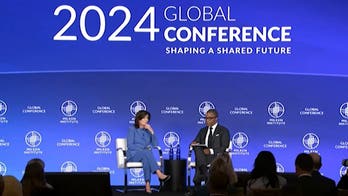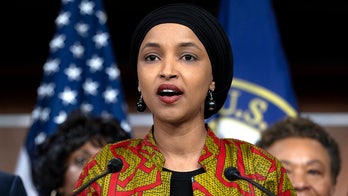Barack Obama has wrapped up the most important parts of his values week. He delivered a speech on patriotism Monday in Independence, Mo., a speech on faith on Tuesday in Zanesville, Ohio, and speech on national service on Wednesday in Colorado Springs, Colorado.
On Wednesday The Bourbon Room interviewed two pollsters on whether this week worked or failed.
One was Doug Schoen, a prominent Democratic pollster who worked for former President Bill Clinton after Democrats lost control of Congress in 1994. Schoen is credited with helping Clinton regain his political footing and win a second term in 1996. Schoen worked under Dick Morris, the top Clinton strategist in those "comeback" years.
The other pollster was David Winston. Winston was top pollster for former House Speaker Newt Gingrich from 1997 to 1998 and has polled for top Republicans in Congress in recent years. The Bourbon Room would like to thank Fox's Allyson Walker for transcribing the full taped interviews that produced the quotes you see below.
Here's Schoen's take on Obama's week so far:
"I think it's a wise strategic move. I think it is critically important to the campaign and I think by moving to the right on values-related issues: national service, faith-based initiatives, patriotism he's rebutting one of the central negatives he has. The fact that John McCain is letting him do this is a major strategic blunder on McCain's part."
Schoen said the week will go along way as the campaign progresses to minimize memories of Obama's relationship with the Rev. Jeremiah Wright, Fr. Michael Pflager and others who have -- at least in the minds of some -- undermined or obliterated Obama's image as a post-racial, post-partisan politician.
"I think it is eradicating the memory of those people who Barack Obama recognizes, quite rightly, have no place in the dialog," Schoen said. "He wants to reengage and the fact that John McCain has apparently allowed this process to go forward without challenge is a huge benefit to the Obama candidacy. I think he's going to be significantly advantaged by these initiatives in a way that, arguably, before this week there were major questions about his patriotism, about his commitment to faith-based initiatives, about his values. He 's addressed them pretty successfully."
While it might sound off-putting to some Obama supporters, Schoen said the values week looked to him very much like the strategy of "triangulation" the Clinton White House adopted to deal with the Republican majority in Congress.
"It strikes me as exactly what we did with bill Clinton successfully in 1996 and I think Barack Obama is moving to the center successfully in a way that will obviously be to his benefit. This is building for the future. This is what we call 'inoculation.' And by inoculation I mean he is able to cover his flank and say 'of course I've made it clear I'm a patriot, of course I support traditional American values."
Lastly Schoen said this strategy isn't about moving poll numbers now but protecting Obama against a drop in poll numbers later if attacks on his character surface later.
"He doesn't need a bump, he needs a bumper and by all accounts, he's getting a pretty strong reinforcement in the last three days."
Winston, as you might imagine, has a completely different take.
"Barack Obama's got one big structural problem as he looks toward this election. That is he's basically a far left candidate in a center-right country. What he's now trying to do is what every typical politician does after winning their nomination and that is to move to the center. The problem that he has here, however, is that he is supposed to be an atypical politician and so doing a typical political move may sort of conflict with a lot of principles he's trying to protect."
Winston calls the week on values a mistake because it's too late to reshape Obama's image.
"People know who this person is so if suddenly you're going to come in with a whole slough of different positions than what's clearly been held before that creates conflict for a lot of people. That's where I think they're making a significant error. This is not reintroducing him or trying to shape who he is. People know who he is. And the question is 'What's he going to do?' And that's the question he's not answering. I think it's overtly naive. How do you re-define someone who's 100 percent known? I think they're making a fundamental error. The biggest problem that he has at this point is "what are you gonna do?" What are your policies that you're trying to implement? I think what they need to do is he needs to develop his economic policy. It's the number-one issue in the country. it's what people are focused on, gas prices are driving, a lot of people's perceptions of what's going on with the economy."
So there you have it, two veterans of 1990s era politics who see something very familiar in Obama's general election strategy. Schoen, who did not for Hillary Clinton's campaign, and Winston, who is not working for John McCain's campaign, see the week very differently. Winston's delighted Obama hasn't used a week with McCain out of the country to pound him on the 'Bush economy." Schoen thinks there's plenty of time for that and Obama needed to shore up some weaknesses first.
Let the debate over these tactics begin.




